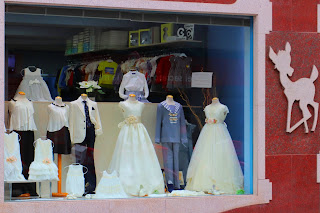Once a Catholic
I'm not really sure how Catholic Spain is. It's absolutely true that, outside a Spanish Parish church just before lunch on a Sunday there will be sizeable crowd but, if what my mum says is true, her Anglican church is a lively place too. Google has the figures of course. The (Spanish) Centre for Sociological Investigation said that, in March 2021 just short of 60% of the Spanish population defined itself as Catholic. The same report said that many of those people were not practising Catholics but only went to church for social occasions. In fact, according to the Spanish equivalent of the UK Office for National Statistics, in October 2021 only 22% of Spaniards went to mass or confession on a regular basis whilst over one third of Spaniards said that they were atheist or agnostic.
I think that line about social occasions is the key. Although you still see a lot of women in posh frocks and men in very tight suits waiting in ambush, with confetti, outside churches, the number of church weddings is in free-fall. In 2020 only 10% of all Spanish weddings were church ceremonies. The pandemic and same sex weddings help to explain some of that figure but there is an obvious and real drop from the 75% of all weddings in the year 2000 being in church, to just 20% in pre-pandemic 2019 Spain. It's the same with baptisms: from 350,000 in 2010 to 190,000 in 2018. Again a demographic change, lower birth rates, probably exacerbate that figure but the decline is obvious. On the other hand, as you will guess, if you've seen the child sized white "wedding" dresses and sailor suits in the children's clothing shops, or ever tried to get into a restaurant in the run up to Corpus Christi, you'll know that Communions have held up pretty well. The drop there is much less pronounced from around 250,000 in 2009 to 220,000 in 2018. The clue though is in the shocking figure that the median spend on a First Communion is now 3,000€. You'll know where a lot of that money goes if you've ever tried to book a restaurant in the run up to Corpus Christi. First Communions are good for a show of piety, followed by a party as a show of wealth or status.
The difficulty comes in separating social customs from religious customs. Consider the British Poppy Day, Remembrance Day. I don't know what the correct definition of Remembrance Day is but f you were to ask me for some top of the head version I'd say that it's about recognising the service of men and women in the military. I don't think of it as a particularly Christian or Anglican event but I suppose it is. As I remember it the Bishop of London takes over where the sergeant majors leave off. Religious views are often left unspoken but it's clear that not all of the people who have some role at the Cenotaph on Remembrance Day, be they hard bitten left wing union leaders or soldiers of the Gurkha regiment, will be Anglicans. Nonetheless they keep their heads down and get on with it. My opinion is that it's exactly similar in Spain. Holy Week, with the processions, with the floats, the tronos, carried on shoulders, with the silent parades as Good Friday starts, with the saetas sung from the balconies is about as Catholic an event as you can imagine but I'm almost certain that not everyone carrying those floats is a card carrying Catholic.
I don't think there's a Spanish public holiday that isn't linked to the Catholic calendar and nearly all of the fiestas are church linked. Schools and Hospitals often have Catholic names. Until very recently Government ministers swore their oaths with one hand on a bible facing a small crucifix. Children were often named for the Saint's day on which they were born. As I write San Antón has passed but San Blas events are under way. The midsummer bonfires in Alicante are San Juan, the fiestas in Pinoso are around the Virgin del Remedio, The Fallas in Valencia are for la Virgen de los Desamparados and even the Christmas running races are named for a saint - San Silvestre. The official name for the National Day, on 12 October, is Día de la Hispanidad but for most it's el Pilar, named for the Virgen del Pilar. Again I suspect that the name is just a vestige of a Catholic tradition. For most people it's just a day to get a nice meal, to head off to the coast or to meet family. Probably most Spaniards know the religious root but consider the days to be essentially secular though, as the saying goes, once a Catholic, always a Catholic.




Comments
Post a Comment